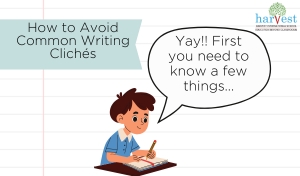How to Avoid Common Writing Clichés
- Avoid writing clichés
- Avoid writing clichés
- Avoid writing clichés
- Best CBSE schools in Bangalore
- Best CBSE schools in Bangalore
- Best CBSE schools in Bangalore
- Best schools in Electronic City
- Best schools in Electronic City
- Best schools in Electronic City
- Good CBSE schools in Sarjapur Road Bangalore
- Good CBSE schools in Sarjapur Road Bangalore
- Good CBSE schools in Sarjapur Road Bangalore
- Harvest International School
- Harvest International School
- Harvest International School


Avoid writing clichés
Writing is one of the most powerful ways to express ideas, emotions, and perspectives. However, when writing becomes filled with clichés—overused phrases and predictable expressions—it loses its originality and impact. Whether you’re a student, professional, or aspiring writer, learning how to avoid common writing clichés will make your work more engaging, fresh, and compelling.
At Harvest International School, we encourage students to develop strong writing skills that stand out. As one of the best schools in Electronic City, we emphasize creativity and originality in academic writing, storytelling, and critical analysis. Whether you’re writing an essay, crafting a speech, or composing a personal statement, eliminating clichés will make your writing more impactful.
What Are Writing Clichés?
A cliché is a phrase, expression, or idea that has been overused to the point where it loses its originality and effectiveness. Examples include phrases like “think outside the box,” “every cloud has a silver lining,” or “the calm before the storm.” While these expressions might have been powerful at some point, their frequent use has made them predictable and uninspiring.
If you’re studying at one of the best CBSE schools in Bangalore, you’ve likely encountered the challenge of avoiding clichés in essays and creative writing assignments. By replacing clichés with fresh, specific language, you can make your writing more unique and engaging.
Why Should You Avoid Clichés?
- They Make Writing Boring – Readers easily tune out when they come across predictable expressions. Instead of grabbing their attention, clichés make writing feel generic.
- They Reduce Originality – Good writing should reflect your personal perspective, not a collection of overused phrases.
- They Can Be Vague – Many clichés are unclear or lack depth, making them ineffective in conveying strong arguments or emotions.
- They Show Lazy Writing – Using clichés can indicate a lack of effort in choosing precise words and descriptions.
At Harvest International School, one of the best international schools in Electronic City, we teach students to use language in a way that is clear, specific, and expressive. By learning to replace clichés with original expressions, students can elevate their writing skills significantly.
Common Clichés and How to Avoid Them
Now that we understand why clichés weaken writing, let’s explore some of the most common ones and how to replace them with more meaningful alternatives.
1. Clichés in Storytelling
Example: “It was a dark and stormy night.”
🔹 Why it’s a cliché: This phrase has been used countless times to describe a dramatic setting.
🔹 Better alternative: Instead of using this phrase, describe the scene in a unique way:
“The sky roared as rain pounded against the window, drowning out every other sound in the room.”
We encouraged our students to use descriptive language that immerses readers in their stories. By focusing on sensory details, you can create vivid imagery without relying on clichés.
2. Clichés in Academic Writing
Example: “In today’s world, technology is everywhere.”
🔹 Why it’s a cliché: The phrase “in today’s world” is vague and unnecessary.
🔹 Better alternative: Be more specific:
“With the rise of artificial intelligence, technology has become an integral part of modern communication and education.”
Students at the best schools in Electronic City are trained to write with precision and clarity. Instead of generalizations, strong academic writing uses detailed evidence and thoughtful analysis.
3. Clichés in Inspirational Writing
Example: “What doesn’t kill you makes you stronger.”
Why it’s a cliché: This phrase has been overused in motivational speeches and essays.
Better alternative: Instead of using a generic phrase, make it personal:
“Overcoming setbacks has taught me resilience and the ability to adapt to challenges.”
At the best CBSE schools in Bangalore, students learn to craft inspiring messages with depth and authenticity, avoiding phrases that sound overused.
4. Clichés in Describing People
Example: “He had a heart of gold.”
Why it’s a cliché: This expression is too broad and doesn’t give a clear picture of the person’s personality.
Better alternative: Be specific about what makes the person kind or generous:
“He never hesitated to help a friend in need, always putting others before himself.”
In the best international schools in Electronic City, writing exercises encourage students to create well-rounded characters using vivid and precise descriptions.
5. Clichés in Arguments and Essays
Example: “History repeats itself.”
Why it’s a cliché: While this may be true, it is too vague to be meaningful in an essay.
Better alternative: Provide evidence or examples to support the idea:
“Similar patterns can be observed between the economic crises of the 1930s and 2008, showing that financial instability often results from a lack of regulation.”
In the good CBSE schools in Sarjapur Road Bangalore, students are trained to use specific historical examples and critical analysis instead of relying on broad statements.
How to Replace Clichés with Stronger Writing
Avoiding clichés doesn’t mean you can’t express common ideas—it just means you should do so in a more original and engaging way. Here’s how:
- Be Specific – Instead of using a general phrase, add details that bring your idea to life.
Instead of “She was as busy as a bee,” say “She barely had time to eat lunch between back-to-back meetings.” - Use Vivid Imagery – Show, don’t tell. Instead of stating that someone is sad, describe their actions or expressions.
Instead of “Tears streamed down her face,” say “She wiped her eyes, trying to steady her trembling hands.” - Think Creatively – If a phrase feels overused, try saying it in a new way.
Instead of “Don’t judge a book by its cover,” say “First impressions don’t always reveal the full story.” - Use Stronger Verbs and Adjectives – Replace weak words with more powerful and precise ones.
Instead of “He walked slowly,” say “He dragged his feet with each step, reluctant to move forward.”
At Harvest International School, one of the best CBSE schools in Bangalore, students are encouraged to experiment with language, using creative expressions that make their writing stand out.
Why Original Writing Matters
Originality is what makes writing memorable and engaging. Whether you’re crafting a personal statement for university applications or an article for a school competition, avoiding clichés will help you stand out.
At our school students are taught to express their thoughts with clarity, depth, and authenticity. Writing is not just about following rules—it’s about finding your voice and making an impact through words.
Final Thoughts
Clichés are everywhere, but strong writers know how to avoid them and create fresh, meaningful content. By being specific, using vivid imagery, and thinking creatively, you can make your writing stand out.
At Harvest International School, one of the best schools in Electronic City, we believe that writing is a skill that can be refined with practice. Our curriculum emphasizes strong communication skills, helping students develop the ability to write clearly, persuasively, and originally.
If you’re looking for a school that nurtures creativity and academic excellence, consider Harvest International School, one of the good CBSE schools in Sarjapur Road Bangalore—where students are encouraged to think beyond clichés and express themselves in meaningful ways.
By eliminating clichés, you can elevate your writing and make a lasting impression. Keep practising, keep refining, and most importantly—keep writing in your own unique voice!
